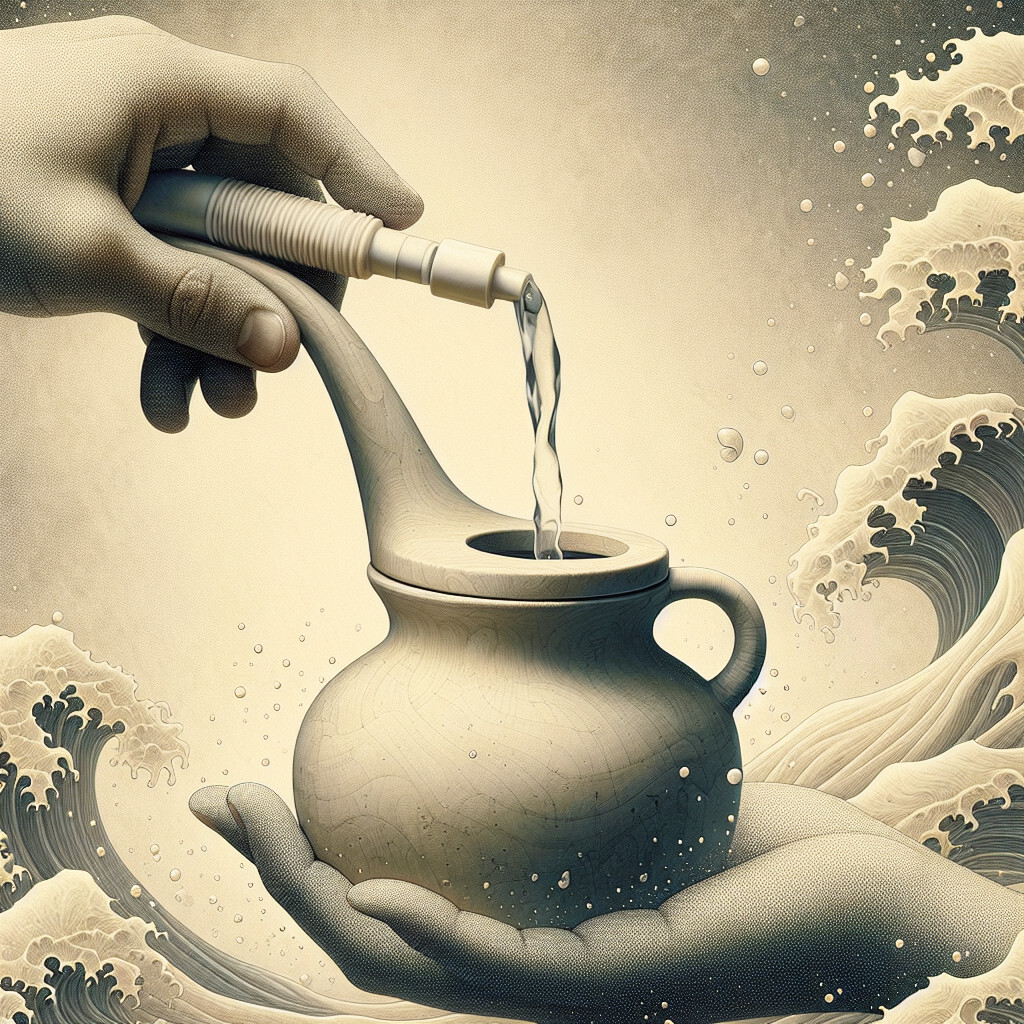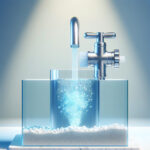-
Table of Contents
“Clear Sinuses, Pure Comfort: Filtered Tap Water for Your Neti Pot”
Introduction

Filtered tap water for a neti pot refers to tap water that has been purified or treated to remove any impurities or contaminants before being used in a neti pot. A neti pot is a device used for nasal irrigation, a practice that involves flushing out the nasal cavity with a saline solution. Using filtered tap water is crucial as untreated water can contain microorganisms that may lead to infections. Therefore, it’s recommended to use distilled, sterile, or previously boiled water for safety.
Understanding the Importance of Filtered Tap Water for Neti Pot Use
The use of a neti pot, a small container designed to rinse debris or mucus from your nasal cavity, is a common practice in many households. This traditional Ayurvedic therapy, known as ‘jala neti’, has been adopted worldwide for its numerous health benefits, including relief from sinusitis, allergies, and cold symptoms. However, the safety and effectiveness of this practice largely depend on the quality of water used. This article aims to shed light on the importance of using filtered tap water for neti pot use.
The Centers for Disease Control and Prevention (CDC) recommends using distilled, sterile, or previously boiled water for nasal irrigation. This is because tap water, although safe for drinking, cooking, and bathing, may still contain tiny organisms that are harmful when introduced into the nasal passages. These organisms, which are usually harmless when consumed orally, can cause serious infections when they come into contact with the sensitive tissues in your nose and sinuses.
One such case was reported in 2011, where two individuals in Louisiana died from a rare brain infection caused by Naegleria fowleri, a microorganism found in warm freshwater environments. The investigation revealed that both victims had used tap water in their neti pots. This incident underscores the potential risks associated with using unfiltered tap water for nasal irrigation.
To mitigate these risks, it is advisable to use filtered tap water. Filtering tap water removes most of the harmful microorganisms and impurities, making it safer for use in a neti pot. There are several ways to filter tap water. You can use a home water filtration system, a water filter pitcher, or a faucet-mounted water filter. Alternatively, you can purchase commercially available distilled or sterile water.
However, it’s important to note that not all water filters are created equal. Some may not effectively remove all harmful organisms. Therefore, it’s crucial to choose a filter that is designed to remove bacteria, viruses, and protozoa. Look for filters that meet the standards set by the National Sanitation Foundation (NSF) or the American National Standards Institute (ANSI).
If you choose to use tap water without filtering, it’s essential to boil it for at least one minute to kill any potentially harmful organisms. After boiling, let the water cool before using it in your neti pot. This method, although effective, can be time-consuming and inconvenient, especially for those who use a neti pot regularly.
In conclusion, using filtered tap water for neti pot use is a simple yet crucial step to ensure the safety and effectiveness of nasal irrigation. It helps to eliminate the risk of infections caused by harmful microorganisms present in unfiltered tap water. Whether you choose to filter your tap water or boil it, remember that the goal is to protect your health. As with any health practice, it’s always best to consult with a healthcare professional if you have any concerns or questions about using a neti pot.
The Risks of Using Unfiltered Tap Water in Neti Pots
Neti pots, small teapot-like devices, have gained popularity in recent years for their ability to alleviate sinus congestion and other respiratory ailments. They work by flushing out the nasal passages with a saline solution, providing relief from symptoms associated with allergies, colds, and sinus infections. However, it’s crucial to use the right kind of water in these devices. Specifically, filtered tap water is recommended for neti pots, as using unfiltered tap water can pose significant health risks.
Unfiltered tap water, while generally safe for drinking, cooking, and bathing, may contain tiny organisms that are harmful if they enter the nasal passages. These organisms are usually harmless when consumed orally, as the stomach’s acid can neutralize them. However, when introduced directly into the nasal passages, they can bypass the body’s natural defenses, potentially leading to serious infections.
One such organism is Naegleria fowleri, a brain-eating amoeba that thrives in warm freshwater environments. While exceedingly rare, infections caused by this amoeba are usually fatal. In 2011, two individuals in Louisiana died after using neti pots with unfiltered tap water contaminated with Naegleria fowleri. These tragic incidents underscore the importance of using filtered or distilled water in neti pots.
In addition to harmful organisms, unfiltered tap water may also contain trace amounts of chemicals, such as chlorine, which can irritate the delicate mucous membranes in the nasal passages. This can exacerbate the very symptoms the neti pot is intended to alleviate, such as dryness and inflammation.
To ensure the water used in a neti pot is safe, it should be either distilled, sterilized, or filtered with a filter designed to remove bacteria and protozoa. Distilled and sterilized water can be purchased at most grocery stores, while filters can be bought from home goods stores or online. If using filtered tap water, it’s important to ensure the filter is designed to remove potentially harmful organisms. Not all filters are created equal, and some may not provide the level of protection necessary.
Boiling tap water is another option to ensure its safety for use in a neti pot. The Centers for Disease Control and Prevention (CDC) recommends boiling water for one minute (or three minutes at elevations above 6,500 feet) to kill any organisms present. The water should then be left to cool before being used in a neti pot.
In conclusion, while neti pots can provide significant relief from sinus and respiratory symptoms, it’s crucial to use them safely. Unfiltered tap water, while generally safe for other uses, can contain organisms and chemicals that pose a risk when introduced directly into the nasal passages. By using distilled, sterilized, or properly filtered water, or by boiling tap water, these risks can be mitigated. This simple step can help ensure that the use of a neti pot provides relief without introducing new health risks.
Steps to Properly Filter Tap Water for Neti Pot Usage
Neti pots, small teapot-like devices, have been used for centuries in Ayurvedic medicine to flush out nasal passages. This practice, known as nasal irrigation, can be beneficial for those suffering from sinus issues, allergies, or colds. However, it’s crucial to use properly filtered water in a neti pot to avoid potential health risks. This article will guide you through the steps to properly filter tap water for neti pot usage.
The first step in ensuring safe neti pot usage is understanding why filtered water is necessary. The human nasal passages are delicate and can be easily infected by harmful microorganisms. Tap water, while generally safe to drink, can contain tiny organisms that are harmless when ingested but can cause serious infections if they come into contact with the sensitive nasal membranes. Therefore, it’s essential to use water that’s been properly disinfected and filtered.
The simplest way to ensure your tap water is safe for neti pot usage is by boiling it. Boiling water for at least one minute can kill most types of harmful microorganisms. If you’re at an elevation above 2,000 meters, you should boil the water for at least three minutes to ensure all potential pathogens are killed. After boiling, let the water cool down to a lukewarm temperature before using it in your neti pot. It’s important to remember that the water should not be too hot, as this can cause discomfort or even burns in your nasal passages.
If boiling water is not a convenient option for you, another method is to use a filter designed to remove potentially harmful organisms. Not all water filters are created equal, so it’s important to choose one that has a pore size of 1 micron or smaller. This size is effective in filtering out the majority of microorganisms that could cause infection. After filtering, it’s recommended to use the water immediately or store it in a clean, closed container in the refrigerator for up to 24 hours.
Alternatively, you can opt for bottled water labeled as “distilled” or “sterile.” These types of water have undergone processes to remove or kill microorganisms, making them safe for use in a neti pot. However, it’s important to note that not all bottled water meets these criteria. Some bottled water is simply tap water that may not have been treated to remove harmful organisms. Therefore, always check the label before using bottled water in your neti pot.
Lastly, regardless of the method you choose to disinfect and filter your water, it’s crucial to clean your neti pot thoroughly after each use. Rinse the pot with filtered, distilled, or boiled and cooled water, not tap water. Then, let it air dry completely before storing it to prevent the growth of bacteria or fungi.
In conclusion, while neti pots can be a helpful tool in maintaining nasal health, it’s vital to use properly filtered water to avoid potential health risks. By boiling tap water, using a suitable filter, or opting for distilled or sterile bottled water, you can safely enjoy the benefits of nasal irrigation. Remember to clean your neti pot thoroughly after each use to ensure it remains a safe and effective tool for your health and wellness.
Exploring the Benefits of Filtered Tap Water in Neti Pot Nasal Irrigation
Neti pots, small teapot-like devices, have been used for centuries in Ayurvedic medicine to perform nasal irrigation, a practice that involves flushing the nasal passages with a saline solution. This process can help alleviate symptoms of sinusitis, allergies, and colds by removing mucus and debris from the nose. However, the type of water used in a neti pot is of utmost importance. The Centers for Disease Control and Prevention (CDC) recommends using distilled, sterile, or filtered water for nasal irrigation. This article will explore the benefits of using filtered tap water in a neti pot.
Firstly, it is essential to understand why unfiltered tap water is not suitable for use in a neti pot. Tap water often contains low levels of bacteria and protozoa. While these organisms are generally harmless when consumed in drinking water, they can cause serious infections if they come into contact with the sensitive nasal passages. In rare cases, using unfiltered tap water in a neti pot has led to fatal infections caused by the amoeba Naegleria fowleri. Therefore, it is crucial to use water that has been adequately treated to remove these potentially harmful organisms.
Filtered tap water is a safe and convenient option for use in a neti pot. High-quality water filters can effectively remove bacteria, protozoa, and other contaminants from tap water, making it safe for nasal irrigation. Using filtered tap water in a neti pot can provide the same benefits as using distilled or sterile water, but without the inconvenience of having to purchase and store large quantities of bottled water.
Moreover, filtered tap water is an environmentally friendly choice. The production and disposal of plastic water bottles contribute significantly to pollution and waste. By using filtered tap water in a neti pot, individuals can reduce their environmental impact while still ensuring their nasal irrigation practices are safe.
In addition to being safe and eco-friendly, using filtered tap water in a neti pot can also be more cost-effective than using bottled water. While there is an initial cost associated with purchasing a water filter, this can be offset by the savings made from not having to regularly buy bottled water. Furthermore, many water filters only need to be replaced every few months, making them a long-lasting investment.
However, it is important to note that not all water filters are created equal. When choosing a water filter for use with a neti pot, individuals should look for one that is certified to remove bacteria and protozoa. It is also recommended to regularly maintain and replace the filter as per the manufacturer’s instructions to ensure it continues to function effectively.
In conclusion, using filtered tap water in a neti pot is a safe, convenient, and eco-friendly choice for nasal irrigation. It can effectively remove potentially harmful organisms from tap water, reducing the risk of infection. Furthermore, it is a cost-effective option that can help individuals save money in the long run. However, it is crucial to choose a high-quality water filter and maintain it properly to ensure the safety and effectiveness of nasal irrigation practices.
Q&A
1. Question: What is the importance of using filtered tap water for a neti pot?
Answer: Using filtered tap water for a neti pot is important because it removes potentially harmful bacteria, parasites, and other contaminants that could cause infections when introduced into the nasal passages.
2. Question: Can I use unfiltered tap water for my neti pot?
Answer: No, it’s not recommended to use unfiltered tap water for a neti pot. Unfiltered water may contain microorganisms that can cause infections.
3. Question: How can I filter tap water for use in a neti pot?
Answer: You can filter tap water for use in a neti pot by using a water filter that removes bacteria and parasites. Alternatively, you can boil the water for at least one minute and then let it cool before using it.
4. Question: Is it safe to use bottled water in a neti pot?
Answer: Yes, it is generally safe to use bottled water in a neti pot, as long as it is distilled or sterilized. However, not all bottled water is safe, so it’s important to check the label.
Conclusion
In conclusion, filtered tap water can be used in a neti pot, but it must be properly disinfected first, either by boiling or using a filter with an absolute pore size of 1 micron or smaller, to remove potentially harmful organisms. It is also recommended to use distilled or sterile water whenever possible to ensure safety.






